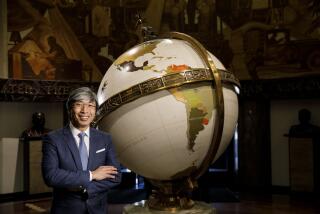James Flanigan, longtime Times business columnist, dies at 85

James Flanigan, whose twice-weekly column was a mainstay of business coverage at The Times for some two decades, died Aug. 19 after a brief illness. He was 85.
From the mid-1960s — when he was lured west from a high-level editing job at Forbes to strengthen The Times’ business and financial coverage — until 2005, Flanigan guided Times readers through a period of dizzying changes in business, market booms and crashes, bubbles and bursts, scandals and triumphs.
“He became an instant star in Los Angeles for both his investigative reporting and his powerful writing,” recalled Paul E. Steiger, the former Times business editor who recruited Flanigan and later served as managing editor of the Wall Street Journal and, until 2020, executive chairman of ProPublica, the nonprofit investigative journalism organization, which he helped found in 2008.
Steiger called Flanigan “an incredible talent. His was one of the greatest combinations of reporting insight, human empathy, and writing flair that I ever encountered in business and economic journalism.”
Readers knew to expect in a Flanigan column percipience and foresight, expressed in graceful, unaffected prose. His colleagues at The Times remember him for his generosity of spirit, old-school colleagueship and his optimistic outlook on life — and for supplying cookies to the business news staff every Thursday, invariably accompanied by a stanza or two of inspired topical verse.
As early as 1983, Flanigan warned that the gap between rich and poor in America was widening. The ethos of “Neiman Marcus for the fortunate, K-Mart for the rest,” he wrote then, was “reversing an egalitarian trend of half a century.” He called for a redoubled investment in education “to keep us a society with opportunity for all.”
That same year, pondering Pope John Paul II’s defense of the Solidarity trade union during a visit to his Polish homeland, Flanigan reminded his readers that “the striving for dignity in the American work force is in our oldest tradition — way back beyond the rise of labor unionism in the late 19th Century, to the very beginnings of our industry in New England.”
A recurrent theme in Flanigan’s work was the benefits of immigration. On July 3, 2005, in his final Sunday column for The Times, he placed that in a personal context.
“Eighty years ago James Flanigan, my father, immigrated to New York from County Clare,” Ireland, he wrote. “He was 21 years old with just seven years of schooling. He found work loading trucks in a warehouse. In 1927, Jane Whyte arrived from the same little town of Lahinch. She was 23 with six years of education. She went to work — as most of the Irish girls of that day did — in live-in domestic service.”
In the 1930s, he recounted, his father became one of the founders of New York’s Grocery Warehouseman’s Union (later to become part of the Teamsters), but continued to work nights in warehouses all his life, building an America that “gave me a great education and the opportunity to be a fellow who could follow dreams and love the work every day that I’ve done.”
Those who had come to America, he wrote, “found work and education for their children. And with the education, their children got better work. As it was then, so it is now and will be. As the Irish say, God bless the work.” Flanigan’s first wife, Anne, was also an immigrant from Ireland. She died in 1992.
Flanigan’s abiding faith in the role of immigration in building America helped make him a most perceptive chronicler of the new immigrant experience — that wave of Asian and Latino entrepreneurship that has built California in recent decades.
The explosive, tumultuous emergence of Asia as an economic force he saw as something to be not feared but comprehended, and he spent much of 1999 on extended tours of Japan, Korea and China to make the phenomenon intelligible to the readers of The Times.
In his last book, “The Korean-American Dream,” published in 2018, Flanigan traced the rise of that ethnic community to the status of “both a piece of the American fabric and a light shining toward America’s future.”
Flanigan’s work brought him numerous awards, capped in 2014 by the Lifetime Achievement Award of the Gerald R. Loeb Awards, which are considered the highest accolades in American business journalism.
“Jim is, by nature, confident in the future — in Southern California’s and in the country’s, also the world’s,” observed Martin Baron, who recently retired as executive editor of the Washington Post and was business editor of The Times for part of Flanigan’s tenure as its business columnist, in supporting Flanigan’s nomination for the award.
“He does not dismiss the obstacles, the failures, and the follies,” Baron noted, “but he has seen again and again how they are overcome through innovation, drive, and entrepreneurship, here and in much of the developing world.”
Recalls Flanigan’s daughter, Siobhan: “My father had two sayings that he repeated to me all my life, all the time: ‘Life is joy,’ and ‘There are no uninteresting people in the world.’”
“Business journalism is a demanding but knockabout trade,” Flanigan would say, “full of secret clues and red herrings.” Questing for those secrets led him around the world, including to the Soviet Union during the Cold War and to Iraq, Syria and Saudi Arabia after the Gulf War. “He chased stories in Japan and Egypt and all over Europe and the United States,” Siobhan recalled.
James Joseph Flanigan was born in the Bronx, N.Y., on June 6, 1936. He graduated from New York’s Cardinal Hayes High School and in 1961 from Manhattan College, which he completed after a two-year stint in the Army. In 1963 he secured his job as a business reporter at the Herald Tribune, where he had worked during college as a night copy boy and after graduating as an editorial assistant and a New York-based reporter for the Tribune‘s Paris edition.
There he came under the wing of his first important mentor in journalism, Tribune business editor Ben Weberman.
“I went to Ben and confessed, ‘I don’t know much about business,’” Flanigan recalled.
Weberman replied, “So I’ll teach you, and you’ll learn how the real world works.”
After the Herald Tribune folded in 1966, Flanigan moved to the business magazine Forbes. There he met his second mentor, the magazine’s legendary editor, James W. Michaels.
Michaels demanded that the writing be clear and complex situations be explained to the reader simply and directly, Flanigan recounted. “‘Readers are nervous individuals,’” he would say. “‘You must take them by the elbow and walk them through.’ A story should be ‘dulce et utile,’ sweetly or wittily told but come to the point.”
A few years after joining The Times, Flanigan was recruited back to New York by Michaels for a top-level writing and editing role. The Times got him back, however, with an offer to become a columnist. After retiring from The Times in 2005, Flanigan continued to write, contributing a monthly column to the New York Times. His first book, “Smile Southern California, You’re the Center of the Universe: The Economy and People of a Global Region,” appeared in 2009.
Flanigan is survived by his daughter, Siobhan, of Portland, Ore.; his son Michael, of Chino; and his wife, the former Patricia Quatrine, whom he married in 1997. He is also survived by nine grandchildren and three stepdaughters, Gina Quatrine of Redondo Beach; Pamela Haase of Plymouth, Mich.; and Christine Conway of Malibu.
Funeral arrangements are pending. The family asks that in lieu of flowers, contributions be made to Manhattan College.
More to Read
Get the latest from Michael Hiltzik
Commentary on economics and more from a Pulitzer Prize winner.
You may occasionally receive promotional content from the Los Angeles Times.







